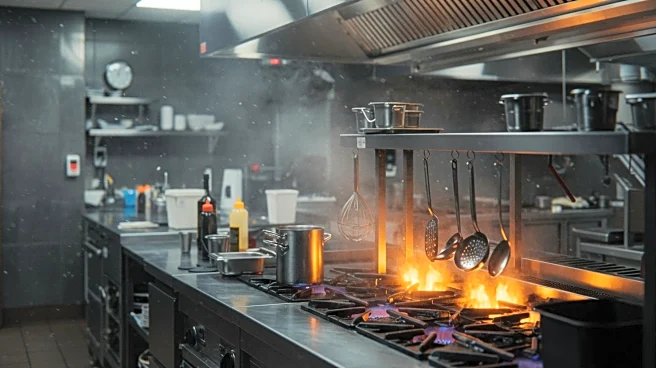What's Happening?
Kitchen staff in Hull are experiencing significant challenges due to a heatwave affecting the UK. Workers at various restaurants, including the Salt and Pepper Club and Chinese Whispers, are struggling to maintain a comfortable working environment as temperatures soar. John Leedham, a restaurant manager, and Ryan Albano, a head chef, describe the difficulties of working in such conditions, noting that ventilation is limited and extractor fans are insufficient to cool the space. Despite these challenges, staff like Rachel Stainton from Boss Burrito remain optimistic, emphasizing the importance of patience from customers as they navigate the heat while maintaining service quality.
Why It's Important?
The heatwave presents operational challenges for the food and beverage industry, impacting both employee well-being and customer service. High temperatures can lead to decreased productivity and increased stress for kitchen staff, potentially affecting the quality and speed of service. This situation highlights the need for effective workplace adaptations to ensure employee safety and comfort, which is crucial for maintaining business operations during extreme weather conditions. The broader implications include potential economic impacts on the hospitality sector if such weather patterns persist, necessitating strategic planning and investment in infrastructure improvements.
What's Next?
As temperatures are expected to cool in the coming week, businesses may experience temporary relief. However, the recurring nature of heatwaves suggests a need for long-term solutions, such as improved ventilation systems and heat management strategies. Restaurant owners and managers might consider investing in these areas to better prepare for future heatwaves. Additionally, there may be increased advocacy for workplace regulations that address extreme weather conditions, ensuring that employees are protected and businesses can continue to operate efficiently.
Beyond the Headlines
The heatwave in Hull underscores the broader issue of climate change and its impact on daily life and business operations. As extreme weather events become more frequent, industries must adapt to mitigate risks and ensure sustainability. This situation also raises questions about the resilience of infrastructure and the need for policies that support climate adaptation in urban settings. The cultural dimension includes shifting public attitudes towards climate change and the importance of community support for affected workers.








